The Hundred Secret Senses Read online
Page 13
So along with all the sound effects in our house, I tried to pretend I wasn’t bothered by Elza’s music. I tried to ignore the increasing distance between Simon and me. I tried to believe that in matters of marriage, as with earthquakes, cancer, and acts of war, people such as myself were immune to unexpected disaster. But to pretend that all was right with the world, I first had to know what was wrong.
9
KWAN'S FIFTIETH
Simon and I never replaced the cheap-glass chandelier. When we first moved in, we found it offensive, a glaring insult to good taste. Later, the fixture became a joke. And soon it was merely a source of light we took for granted. It was there but not noticed, except when one of the bulbs burned out. We even tried to rid ourselves of this reminder by buying a dozen light bulbs from a blind-veterans’ organization, sixty watts each, guaranteed to last fifty thousand hours, forever in foyer-light years. But then five out of six bulbs burned out within the year. We never got around to putting up the ladder to change them. With one bulb burning, the chandelier was practically invisible.
One night, this was about six months ago now, that last bulb gave out with a small pop, leaving us in darkness. Simon and I were about to go to our usual neighborhood restaurant for an after-work supper. “I’ll buy some real bulbs tomorrow,” said Simon.
“Why not a whole new light fixture?”
“What for? This one’s not so bad. Come on, let’s go. I’m hungry.”
As we walked to the restaurant, I was wondering about what he had said, or rather, how he had said it, as if he didn’t care about our life together anymore. Tacky was now good enough for us.
The restaurant was half empty. Soft, soporific music was playing in the background, white noise, the kind no one really listens to. While glancing at a menu I knew by heart, I noticed a couple in their fifties seated across from us. The woman wore a sour expression. The man seemed bored. I watched them awhile longer. They chewed, buttered bread, sipped water, never making eye contact, never saying a word. They didn’t seem to be having a fight. They just acted resigned, disconnected from both happiness and discomfort. Simon was studying the wine list. Did we ever order anything except the house white?
“You want to share a bottle of red this time?” I said.
He didn’t look up. “Red has all that tannin. I don’t want to wake up at two in the morning.”
“Well, let’s get something different. A fumé blanc maybe.”
He handed me the wine list. “I’m just going to have the house Chablis. But you go ahead.”
As I stared at the list, I began to panic. Suddenly, everything about our life seemed predictable yet meaningless. It was like fitting all the pieces of a jigsaw puzzle only to find the completed result was a reproduction of corny art, great effort leading to trivial disappointment. Sure, in some ways we were compatible—sexually, intellectually, professionally. But we weren’t special, not like people who truly belonged to each other. We were partners, not soul mates, two separate people who happened to be sharing a menu and a life. Our whole wasn’t greater than the sum of our parts. Our love wasn’t destined. It was the result of a tragic accident and a dumb ghost trick. That’s why he had no great passion for me. That’s why a cheap chandelier fit our life.
When we arrived home, Simon flopped on the bed. “You’ve been awfully quiet,” he said. “Anything wrong?”
“No,” I lied. Then: “Well, I don’t know, exactly.” I sat on my side of the bed and started to page through a shopping catalogue, waiting for him to ask me again.
Simon was now using the television remote to change channels every five seconds: a news flash about a kidnapped little girl, a teleno-vela in Spanish, a beefy man selling exercise equipment. As pieces of televised life blipped past me, I tried to gather my emotions into coherent logic Simon could understand. But whatever I’d been stifling hit me in a jumble and ached in my throat. There was the fact that we couldn’t talk about Simon’s sterility—not that I wanted to have children at this point in our lives. And the spooky sounds in the house, how we pretended they were normal. And Elza, how we couldn’t talk about her, yet she was everywhere, in the memory of lies Kwan had told during her yin-talk session, in the damn music Simon played. I was going to suffocate if I didn’t make drastic changes in my life. Meanwhile, Simon was still bouncing from one channel to the next.
“Do you know how irritating that is?” I said tersely.
Simon turned off the TV. He rolled over to face me, propped on one arm. “What’s wrong?” He looked tenderly concerned.
My stomach clenched. “I just wonder sometimes, Is this all there is? Is this how we’re going to be ten, twenty years from now?”
“What do you mean, is this all?”
“You know, living here in this funky house, putting up with the noise, the tacky chandelier. Everything feels stale. We go to the same restaurant. We say the same things. It’s the same old shit over and over again.”
He looked puzzled.
“I want to love what we do as a couple. I want us to be closer.”
“We’re together twenty-four hours a day as it is.”
“I’m not talking about work!” I felt like a small child, hungry and hot, itchy and tired, frustrated that I couldn’t say what I really wanted to. “I’m talking about us, what’s important. I feel like we’re stagnating and mold is growing around the edges.”
“I don’t feel that way.”
“Admit it, our life together won’t be any better next year than it is today. It’ll be worse. Look at us. What do we share now besides doing the same work, seeing the same movies, lying in the same bed?”
“Come on. You’re just depressed.”
“Of course I’m depressed! Because I can see where we’re headed. I don’t want to become like those people we saw in the restaurant tonight—staring at their pasta, nothing to say to each other except, ‘How’s the linguini?’ As it is, we never talk, not really.”
“We talked tonight.”
“Yeah, sure. How the new client is a neo-Nazi. How we should put more in our SEP account. How the co-op board wants to raise the dues. That’s not real talk! That’s not real life. That’s not what’s important in my life.”
Simon playfully rubbed my knee. “Don’t tell me you’re having a mid-life crisis? People had those only in the seventies. Besides, today there’s Prozac.”
I brushed his hand away. “Stop being so condescending.”
He put his hand back. “Come on, I’m joking.”
“Then why do you always joke about important things?”
“Hey, you’re not the only one. I wonder about my life too, you know, how long I have to do the things that really matter.”
“Yeah? Like what?” I sneered. “What matters to you?”
He paused. I imagined what he was going to say: the business, the house, having enough money to retire early.
“Go on. Tell me.”
“Writing,” he finally said.
“You already write.”
“I don’t mean what I write now. Do you really think that’s all I’m about—writing brochures on cholesterol and sucking fat out of flabby thighs? Gimme a break.”
“What, then?”
“Stories.” He looked at me, waiting for a reaction.
“What kind?” I wondered if he was making this up on the spot.
“Stories about real life, people here, or in other countries, Madagascar, Micronesia, one of those islands in Indonesia where no tourists have ever been.”
“Journalism?”
“Essays, fiction, whatever allows me to write about the way I see the world, where I fit in, questions I have. . . . It’s hard to explain.”
He started to remove the catalogue from my hand. I grabbed it back. “Don’t.” We were on the defensive again.
“All right, stay in your goddamn funk!” he shouted. “So we’re not perfect. We slip up. We don’t talk enough. Does that make us miserable failures? I mean, we’re not homel
ess or sick or working in mindless jobs.”
“What, I’m supposed to be happy thinking, ‘Gee, someone else has it worse than I do’? Who do you think I am—Pollyanna?”
“Shit! What do you want?” he snapped. “What could possibly make you happy?”
I felt stuck in the bottom of a wishing well. I was desperate to shout what I wanted, but I didn’t know what that was. I knew only what it wasn’t.
Simon lay back on the pillow, his hands locked over his chest. “Life’s always a big fucking compromise,” he said. He sounded like a stranger. “You don’t always get what you want, no matter how smart you are, how hard you work, how good you are. That’s a myth. We’re all hanging in the best we can.” He exhaled a cynical laugh.
And then I spit out what I had been afraid to say: “Yeah, well, I’m sick of hanging in as Elza’s lousy replacement.”
Simon sat up. “What the hell does Elza have to do with this?” he asked.
“Nothing.” I was being stupid and childish, but I couldn’t stop. A few tense minutes went by before I said: “Why do you have to play that goddamn CD all the time and tell everyone she was your girlfriend?”
Simon stared at the ceiling. He sighed sharply, a signal he was just about to give up. “What’s going on?”
“I just want us, you know, to have a better life,” I stammered. “Together.” I couldn’t meet his eyes. “I want to be important to you. I want you to be important to me. . . . I want us to have dreams together.”
“Yeah, what kind of dreams?” he said hesitantly.
“That’s the point—I don’t know! That’s what I want us to talk about. It’s been so long since we had dreams together, we don’t even know what that means anymore.”
We were at a standstill. I pretended to read my magazine. Simon went to the bathroom. When he returned, he sat on the bed and put his arm around me. I hated myself for crying, but I couldn’t stop. “I don’t know, I don’t know,” I kept sobbing. He patted my eyes with a tissue, wiped my nose, then eased me down on the bed.
“It’s all right,” he consoled. “You’ll see, tomorrow, it’ll be all right.”
But his niceness made me despair even more. He wrapped himself around me, and I tried to choke back my sobs, pretending to be calmed, because I didn’t know what else to do. And then Simon did what he always did when we didn’t know what else to do—he started to make love. I stroked his hair, to let him think this was what I wanted too. But I was thinking, Doesn’t he worry about what’s going to happen to us? Why doesn’t he worry? We’re doomed. It’s just a matter of time.
The next morning, Simon surprised me. He brought me coffee in bed and brightly announced, “I’ve been thinking about what you said last night—about having a dream together. Well, I have a plan.”
Simon’s idea was to draw up a wish list: something we could do together, which would allow us to define what he called the creative parameters of our life. We talked openly, excitedly. We agreed the dream should be risky but fun, include exotic travel, good food, and most important, a chance to create something that was emotionally satisfying. We did not mention romance. “That takes care of the dream part,” he said. “Now we have to figure out how to make it happen.”
At the end of our three-hour discussion, we had conjured up a proposal that we would mail to a half-dozen travel and food magazines. We would offer to write and photograph a story on village cuisine of China; this would involve a junket to serve as the model for future food and folk-culture articles, possibly a book, a lecture tour, maybe even a cable TV series.
It was the best talk Simon and I had had in years. I still didn’t think he completely understood my fears and despair, but he had responded in the best way he could. I wanted a dream. He made a plan. And when I thought about it, wasn’t that enough to give us hope?
I realized we had about a one-zillionth-percent chance of getting even a nibble on our proposal. But once the letters were out in the universe, I felt better, as if I’d hauled off my old life to Goodwill. Whatever came next had to be better.
A FEW DAYS after Simon and I had our tête-à-tête, my mother called with a reminder to bring my camera to Kwan’s house that evening. I looked at the calendar. Shit, I had completely forgotten we were supposed to go to Kwan’s for her birthday. I ran upstairs to the bedroom, where Simon was watching Super Bowl highlights, his lanky body stretched across the rug in front of the TV. Bubba was lying next to him, chewing on a squeaky toy.
“We have to be at Kwan’s in an hour. It’s her birthday.”
Simon groaned. Bubba jumped up into sitting position, front paws paddling, whining for his leash.
“No, Bubba, you have to stay.” He slumped to the floor, head on paws, gazing at me with woeful eyes.
“We’ll stay long enough to be social,” I offered, “then skip out early.”
“Oh, sure,” said Simon, eyes still on the screen. “You know how Kwan is. She’ll never let us leave early.”
“Well, we have to go. It’s her fiftieth.”
I scanned the bookshelves to find something that might pass for a birthday gift. An art book? No, I decided, Kwan wouldn’t appreciate it, she has no aesthetic sense. I looked in my jewelry box. How about this silver-and-turquoise necklace I hardly ever wear? No, my sister-in-law gave me that, and she’d be at the party. I went downstairs to my office, and that’s where I spotted it: a mock-tortoiseshell box slightly larger than a pack of cards, perfect accompaniment for Kwan’s kitschy junk. I had bought the box while Christmas shopping two months before. At the time, it looked like one of those all-purpose gifts, compact enough to tuck in my purse, just in case someone, for instance a client, surprised me with a Christmas present. But this year, no one did.
I went to Simon’s study and rummaged around in his desk for wrapping paper and ribbon. In the bottom left-hand drawer, tucked in the back, I found a misplaced diskette. I was about to file it in Simon’s storage box, when I noticed the index name he had written on the label: “Novel. Opened: 2/20/90.” So he was trying to write something important to him after all. He’d been working on it for a long time. I felt wounded that he hadn’t shared this with me.
At that point, I should have respected Simon’s privacy and filed the diskette away. But how could I not look? There was his heart, his soul, what mattered to him. I turned on the computer with shaky hands, slipped in the diskette. I called up the file named “Chap. 1.” A screenful of words flashed on a blue background, and then the first sentence: From the time she was six, Elise could hear a song once, then play it from memory, a memory inherited from her dead grandparents.
I scrolled through the first page, then the second. This is schlock, this is drivel, I kept telling myself. I read page after page, gorging myself on poison. And I imagined her, Elza, stroked by his fingertips, gazing back at him on the screen. I could see her smirking at me: “I came back. That’s why you’ve never been happy. I’ve been here all along.”
CALENDARS DON’T MEASURE time for me anymore. Kwan’s birthday was six months ago, a lifetime ago. After I came home from her party, Simon and I fought viciously for another month. The pain seemed to last forever, but love disintegrated in a second. He camped out in his study, then moved out at the end of February, which now feels so long ago I can’t even remember what I did the first few weeks alone.
But I’m getting used to the change. No routines, no patterns, no old habits, that’s the norm for me now. It suits me. As Kevin told me last week at his birthday party, “You look good, Olivia, you really do.”
“It’s the new me,” I said in a flip tone. “I’m using a new face cream, fruit acids.”
I’ve surprised everyone by how well I’ve been doing—not just coping, but actually carving out a new life. Kwan is the only one who thinks otherwise.
Last night on the phone, she had this to say: “You voice, so tired-sounding! Tired live alone, I think. Simon same way. Tonight two you come my house eat dinner, like old time, just be friend—�
��
“Kwan, I don’t have time for this.”
“Ah, so busy! Okay, not tonight. Tomorrow, too busy again? You come tomorrow, ah.”
“Not if Simon’s there.”
“Okay-okay. Just you come tonight. I make you potsticker, your favorite. Also give you wonton take home for you freezer.”
“No talking about Simon, right?”
“No talk, just eat. Promise.”
I’M INTO my second helping of potstickers. I keep waiting for Kwan to slip in some mention of my marriage. She and George are talking heatedly about Virginia, a cousin of George’s dead wife, in Vancouver, whose nephew in China wants to immigrate to Canada.
George is chewing a mouthful. “His girlfriend wanted to catch a ride to Canada too. Forced him to marry her. My cousin, she had to start the paperwork all over again. Everything was almost approved, now— Hey! Go back to the end of the line. Wait eighteen more months.”
“Two hundred dollar, new paperwork.” Kwan reaches for a green bean with her chopsticks. “Many-many hour wasted, going this office, that office. Then what? Surprise—baby pop out.”
George nods. “My cousin said, ‘Hey, why didn’t you wait? Now we have to add the baby, start the application process over again.’ The nephew said, ‘Don’t tell the officials we got a baby. The two of us, we come first, go to college, find high-paying jobs, buy a house, car. Later, we find a way to bring the baby, one, two years from now.’ ”

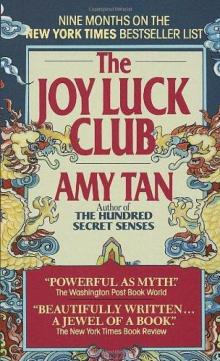 The Joy Luck Club
The Joy Luck Club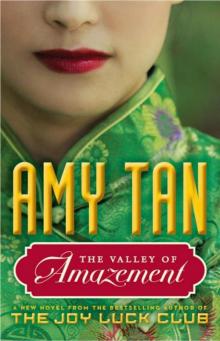 The Valley of Amazement
The Valley of Amazement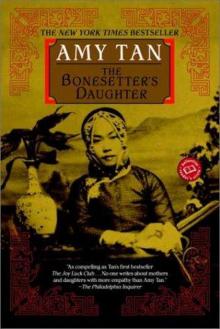 The Bonesetter's Daughter
The Bonesetter's Daughter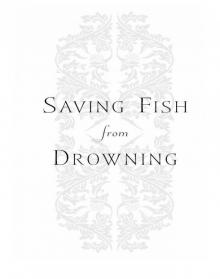 Saving Fish From Drowning
Saving Fish From Drowning Rules for Virgins
Rules for Virgins The Kitchen God's Wife
The Kitchen God's Wife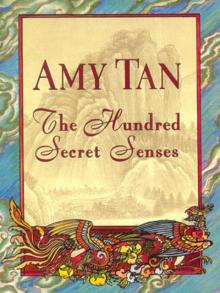 The Hundred Secret Senses
The Hundred Secret Senses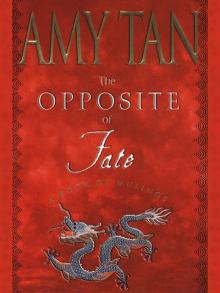 The Opposite of Fate: Memories of a Writing Life
The Opposite of Fate: Memories of a Writing Life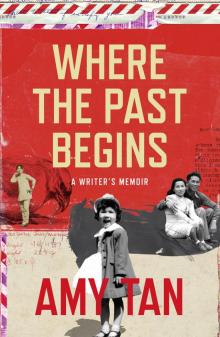 Where the Past Begins
Where the Past Begins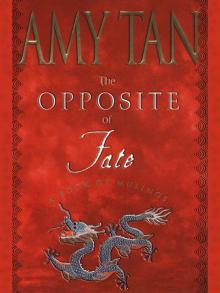 The Opposite of Fate
The Opposite of Fate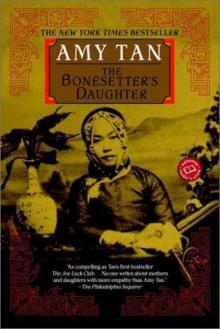 (2001) The Bonesetter's Daughter
(2001) The Bonesetter's Daughter